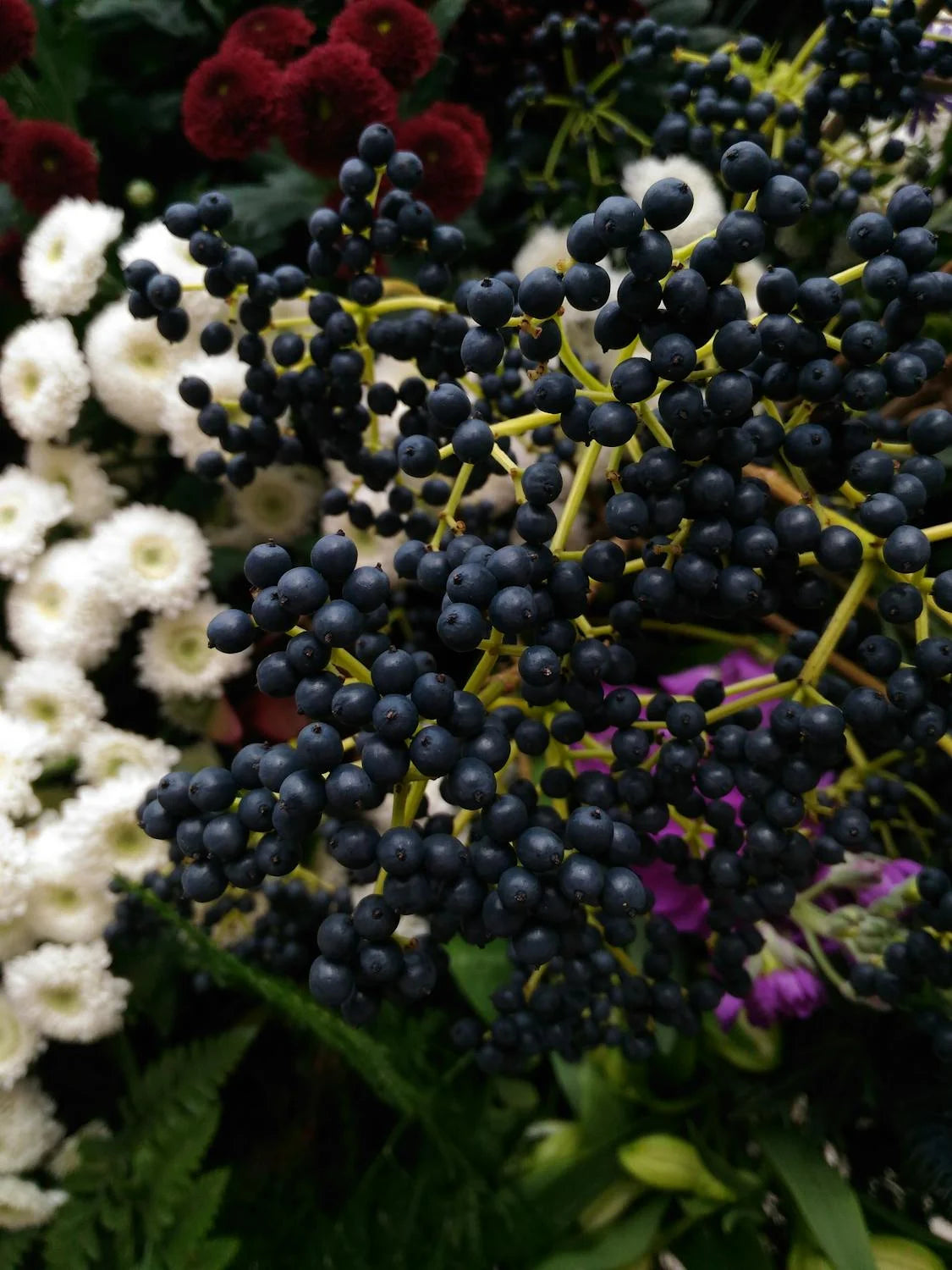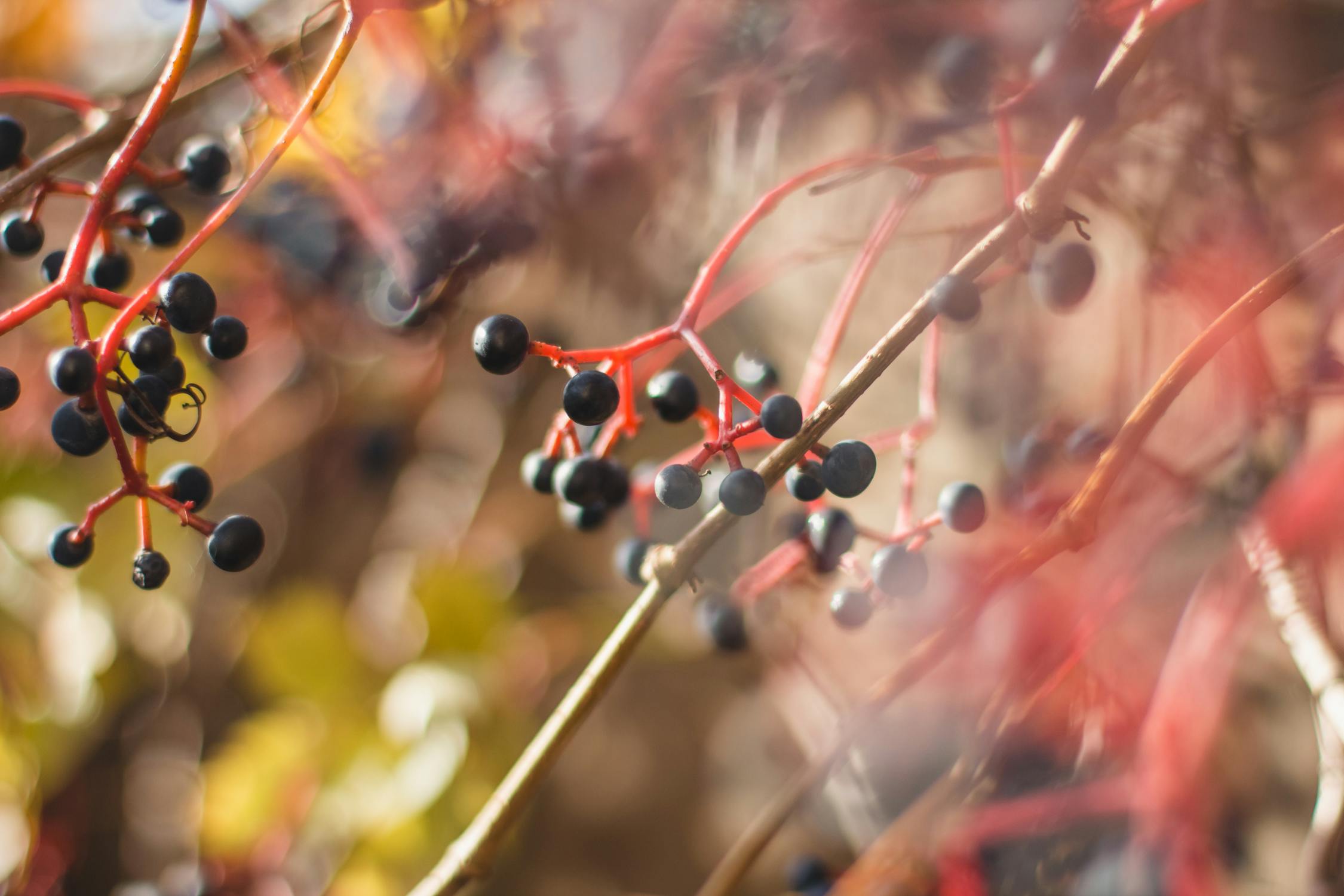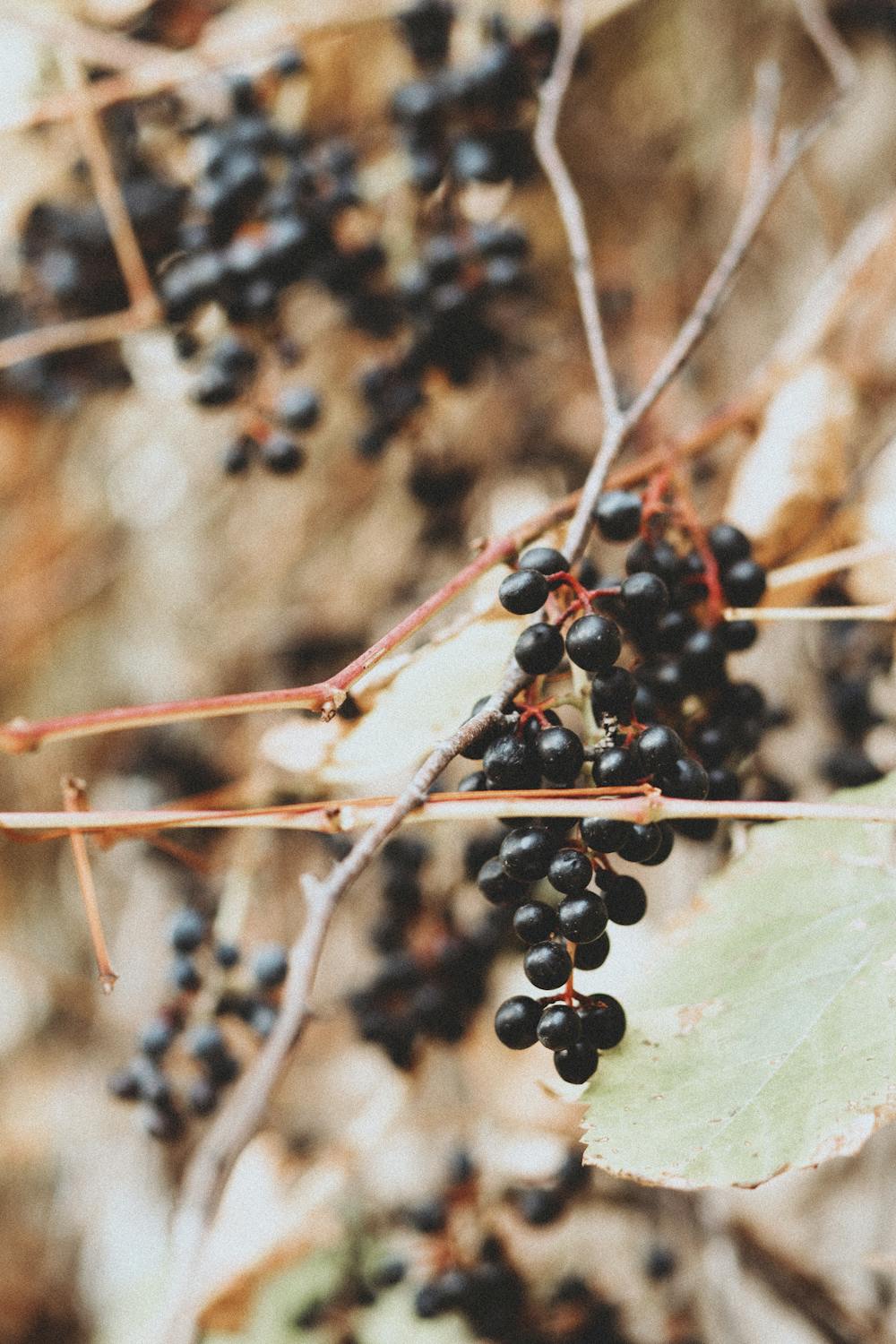
Elderberry 101: Everything You Need to Know About This Superfood
Elderberries have recently surged in popularity, touted as a superfood with a myriad of health benefits. These small, dark berries are more than just a trendy health food; they hold a rich history and cultural significance across various civilizations.
Historically, elderberries have been revered for their medicinal properties. From ancient Egyptians to indigenous tribes of North America, they were used for a range of purposes, from healing wounds to warding off evil spirits. In European folklore, the elder tree, from which these berries are harvested, was considered a protector and healer.
Today, elderberries are celebrated for their nutritional prowess. Packed with vitamins and antioxidants, they are believed to boost immune health, fight inflammation, and provide numerous other health benefits. Their unique flavor and versatility also make them a popular ingredient in culinary creations, from jams and syrups to pies and beverages.
As we delve deeper into the world of elderberries, we'll explore their nutritional profile, health benefits, culinary uses, and much more. Whether you're a health enthusiast or a curious foodie, there's much to discover about this ancient superfood.
What are Elderberries?

Elderberries are small, dark berries that grow in clusters on the elder tree, scientifically known as Sambucus. These berries are renowned not only for their distinctive flavor but also for their various health benefits. Here's a closer look at what elderberries are:
Physical Description:
- Appearance: Elderberries are small, round, and typically dark purple to black in color. They have a glossy appearance when ripe and are about 3-5 mm in diameter.
- Taste and Texture: These berries have a tart, slightly sweet flavor. They're often described as earthy with a hint of bitterness, which is why they're rarely eaten raw and are commonly used in cooked dishes or syrups.
Varieties of Elderberries:
- There are several species of elderberries, with the most common being Sambucus nigra (European elderberry) and Sambucus canadensis (American elderberry). Each variety has its own unique flavor profile and is used differently in culinary and medicinal preparations.
- Some varieties, like the Sambucus nigra, are more commonly used for medicinal purposes due to their higher concentration of beneficial compounds.
Geographic Distribution:
- Elderberries are native to both Europe and North America, and they thrive in a variety of climates. They are commonly found in temperate to subtropical regions of the world.
- The plants prefer moist, well-drained soil and can often be found in wooded areas, along riverbanks, and near roadsides.
Elderberries have a long-standing presence in various cultures, valued both for their distinctive flavor and their medicinal properties.
Nutritional Profile
Elderberries are not only celebrated for their unique taste but also for their impressive nutritional content.
Key Nutrients in Elderberries:
- Vitamins: Elderberries are a rich source of Vitamin C, essential for immune function and skin health. They also contain Vitamin A, which is vital for eye health, and several B vitamins, which play a role in energy metabolism.
- Minerals: These berries are a good source of iron, which is crucial for blood health, and potassium, important for heart and muscle function. They also contain calcium and phosphorus, essential for healthy bones and teeth.
Antioxidants:
- Elderberries are packed with antioxidants like flavonoids and anthocyanins. These compounds help combat oxidative stress in the body, reducing the risk of chronic diseases and aiding in overall health.
- The high levels of anthocyanins give elderberries their characteristic deep purple color and are known for their anti-inflammatory properties.
Comparison with Other Berries:
- When compared to other berries such as blueberries or raspberries, elderberries stand out for their higher levels of certain nutrients like Vitamin C and dietary fiber.
- However, it’s important to note that while elderberries are nutritionally rich, they should be consumed as part of a varied diet to ensure a full range of nutrients.
Dietary Fiber:
- Elderberries are also a good source of dietary fiber, which is beneficial for digestive health. Fiber aids in digestion, helps maintain a healthy gut microbiome, and can support weight management efforts.
Caloric Content:
- Elderberries are relatively low in calories, making them a nutritious yet lightweight addition to any diet. This aspect makes them particularly appealing to those looking to increase nutrient intake without a significant increase in calorie consumption.
The nutritional profile of elderberries is diverse and robust, contributing to their status as a superfood. With a combination of essential vitamins, minerals, antioxidants, and dietary fiber, elderberries offer a range of health benefits while being a versatile and delicious addition to various dishes.
Health Benefits of Elderberries

Elderberries have garnered attention not only for their nutritional value but also for their potential health benefits.
Boosting Immune Health:
- Elderberries are perhaps best known for their immune-boosting properties. High in Vitamin C and antioxidants, they can help strengthen the immune system.
- Several studies suggest that elderberry extract may reduce the duration and severity of cold and flu symptoms. This is attributed to their ability to enhance immune response and inhibit the replication of viruses.
Anti-Inflammatory and Antioxidant Effects:
- The antioxidants in elderberries, such as flavonoids and anthocyanins, help combat oxidative stress in the body. This reduces inflammation and may lower the risk of chronic diseases like heart disease and cancer.
- The anti-inflammatory properties of elderberries make them beneficial for reducing symptoms of arthritis and other inflammatory conditions.
Heart Health:
- Elderberries may have positive effects on heart and blood vessel health. They contain compounds that have been shown to reduce blood pressure and cholesterol levels, both of which are risk factors for heart disease.
- The high fiber content in elderberries also contributes to better heart health by aiding in cholesterol management.
Mental Health and Cognitive Function:
- Some research suggests that the antioxidants in elderberries can have neuroprotective effects. They may help improve cognitive function and reduce the risk of age-related mental decline.
- The stress-reducing properties of elderberries, though less studied, are also considered beneficial for overall mental well-being.
Skin Health:
- The high levels of vitamins A and C in elderberries can benefit skin health. These vitamins are essential for skin regeneration and can help maintain a youthful and healthy complexion.
- Elderberry extracts are often found in skincare products due to their antioxidant properties and ability to improve skin health.
Diabetes Management:
- Preliminary studies have shown that elderberries may help improve insulin resistance and regulate blood sugar levels, making them potentially beneficial for individuals with diabetes.
- However, more research is needed in this area to fully understand their impact on blood sugar management.
The potential health benefits of elderberries are wide-ranging and significant. From boosting immune health to improving heart and skin health, elderberries can be a valuable addition to a healthy diet.
Culinary Uses

Elderberries are not only a nutritional powerhouse but also a versatile ingredient in the kitchen. Their unique flavor profile allows them to be used in a variety of culinary creations, ranging from sweet to savory dishes.
Jams, Jellies, and Syrups:
- One of the most popular uses of elderberries is in the making of jams, jellies, and syrups. Their tart flavor balances well with sugar, making for delightful preserves.
- Elderberry syrup is a staple in many households, especially during the cold and flu season, due to its immune-boosting properties.
Baking and Desserts:
- Elderberries can be baked into pies, tarts, and muffins, offering a burst of flavor and color. They pair well with other fruits like apples or blackberries.
- Elderberry compote or sauce can be a delicious topping for ice cream, yogurt, or cheesecake.
Beverages:
- Elderberries are commonly used to make teas, cordials, and wines. Elderberry tea is not only flavorful but is also sought after for its medicinal properties.
- Homemade elderberry wine is a traditional favorite in many cultures, appreciated for its deep, rich flavor.
Savory Dishes:
- Though less common, elderberries can be incorporated into savory dishes. They can be used in sauces or glazes for meats, particularly game meats like venison or duck.
- Elderberries can also add a unique twist to salads when used fresh or dried.
Culinary Pairings:
- The tartness of elderberries pairs well with sweet, rich, and spicy flavors. They complement spices like cinnamon, ginger, and nutmeg.
- For savory dishes, elderberries can be balanced with herbs like thyme or rosemary.
Preparing Elderberries for Cooking:
- It's important to note that raw elderberries, as well as the leaves and stems of the plant, can be toxic. They should always be cooked before consumption.
- To prepare elderberries for cooking, remove the berries from the stems and wash them thoroughly. Cooking them reduces their bitterness and brings out their sweetness.
Recipe Ideas:
- For those looking to experiment with elderberries in their cooking, try starting with a simple elderberry jam or syrup recipe.
- More adventurous cooks might explore elderberry chutneys or incorporate dried elderberries into granolas or trail mixes.
The culinary possibilities with elderberries are vast and exciting. Whether used in sweet or savory dishes, they add a unique flavor and a host of nutritional benefits. As they gain popularity, more innovative uses and recipes are sure to emerge, inviting both amateur cooks and professional chefs to explore the potential of this superfood in their culinary adventures.
Risks and Considerations
While elderberries are celebrated for their health benefits and culinary versatility, it's important to be aware of certain risks and considerations associated with their consumption.
Raw Elderberries and Plant Parts:
- Raw elderberries, as well as other parts of the elder plant such as leaves, seeds, and stems, contain cyanogenic glycosides, which can release cyanide when digested. Consuming these raw can lead to symptoms of cyanide poisoning, including nausea, vomiting, dizziness, and in severe cases, respiratory failure and death.
- It's crucial to cook elderberries thoroughly before consumption to neutralize these harmful compounds.
Allergic Reactions:
- Some individuals may have allergic reactions to elderberries. Symptoms can range from mild, such as a rash or gastrointestinal discomfort, to severe, like anaphylaxis.
- People who have never consumed elderberries should start with a small amount to check for any adverse reactions.
Interactions with Medications:
- Elderberries may interact with certain medications, particularly those used for diabetes and autoimmune diseases, as they can affect blood sugar levels and immune system activity.
- It's advisable to consult with a healthcare provider before consuming elderberries or elderberry supplements if you are on any medication.
Pregnancy and Breastfeeding:
- There is limited research on the safety of elderberry consumption during pregnancy and breastfeeding. To err on the side of caution, it's often recommended that pregnant or breastfeeding women avoid elderberry supplements.
- As with any supplement or herbal remedy, it's best to consult a healthcare provider before using elderberries during pregnancy or breastfeeding.
Quality of Supplements:
- The market offers a wide range of elderberry supplements, but their quality can vary. Some may contain added sugars, preservatives, or other ingredients that may not be desirable.
- When choosing supplements, look for products from reputable brands and those that have undergone third-party testing for quality and purity.
Overconsumption:
- While elderberries are beneficial, overconsumption can lead to adverse effects, such as an upset stomach or diarrhea, due to their high fiber content and the presence of certain compounds.
- Moderation is key; elderberries should be consumed as part of a balanced diet.
While elderberries offer numerous health benefits, it is important to consume them safely. Proper preparation, awareness of potential interactions and side effects, and consultation with healthcare providers when necessary can ensure that you enjoy the benefits of elderberries without any adverse effects.
Elderberry Supplements

Elderberry supplements have gained popularity as an easy and convenient way to enjoy the health benefits of elderberries. These supplements come in various forms, including syrups, capsules, lozenges, and teas.
Types of Elderberry Supplements:
- Syrups and Liquids: These are commonly used for immune support, especially during cold and flu season. They often contain added ingredients like honey or other herbal extracts for additional benefits.
- Capsules, Pills & Gummies: These offer a more concentrated form of elderberry extract and are typically used for daily supplementation.
- Lozenges: These are convenient for on-the-go use and can provide immediate relief for sore throats and cold symptoms.
- Teas: Elderberry teas are a gentle way to incorporate the benefits of elderberries and can be soothing, especially when combined with other herbs.
What to Look for in Supplements:
- Quality and Purity: Opt for supplements from reputable brands that practice transparent sourcing and manufacturing. Look for products that have undergone third-party testing.
- Ingredient List: Check for any additional ingredients, such as sweeteners, preservatives, or other herbal additives. Some supplements may contain ingredients that are not suitable for everyone.
- Concentration and Dosage: Be aware of the concentration of elderberry in the supplement and follow the recommended dosage instructions.
Use in Different Populations:
- As with any supplement, certain populations, such as pregnant or breastfeeding women, children, and those with specific health conditions, should consult a healthcare provider before using elderberry supplements.
Integrating Supplements into Your Routine:
- Elderberry supplements can be a convenient addition to a daily health routine, especially during times when immune support is a priority.
- They can be used in conjunction with a balanced diet and should not be relied upon as the sole method of obtaining health benefits.
Elderberry supplements offer a practical way to access the benefits of elderberries. However, it's important to choose high-quality products, be mindful of dosages, and understand that supplements should complement, not replace, a healthy diet and medical advice.
Growing and Harvesting Elderberries

Elderberries can be a delightful addition to home gardens, offering both aesthetic appeal and a source of nutritious berries. Below is a basic guide on how to grow and harvest elderberries effectively.
Choosing the Right Variety:
- Select a variety of elderberry that suits your climate and soil conditions. Sambucus nigra (European elderberry) and Sambucus canadensis (American elderberry) are popular choices.
- Consider local varieties that may be more adapted to your region's specific environmental conditions.
Planting Elderberries:
- Elderberries prefer well-drained, fertile soil with a pH between 5.5 and 6.5.
- They thrive in full sun but can tolerate partial shade.
- Plant elderberry bushes in the spring or fall, spacing them 6 to 10 feet apart to allow room for growth.
Caring for Elderberry Plants:
- Regular watering is essential, especially during the first year of growth. Elderberries need consistent moisture but don't tolerate waterlogged soil.
- Mulching helps retain soil moisture and suppresses weeds.
- Pruning is important for elderberry bushes. Remove dead or weak canes in early spring to encourage new growth and larger berry clusters.
Pest and Disease Management:
- Elderberries can be susceptible to pests like aphids and diseases such as powdery mildew. Regular inspection and organic pest control methods can help manage these issues.
- Good air circulation and proper spacing reduce the risk of fungal diseases.
Harvesting Elderberries:
- Elderberries typically ripen in late summer to early fall. Harvest the berries when they are fully ripe, indicated by a deep purple, almost black color.
- Use scissors or pruners to cut the entire clusters and gently remove the berries from the stems.
Post-Harvest Processing:
- Wash the berries thoroughly after harvesting.
- Remember that raw elderberries can be toxic due to cyanogenic glycosides, so they should be cooked before consumption.
- Berries can be dried, frozen, or processed into jams, syrups, and other products.
Sustainable Practices:
- Incorporate organic and sustainable gardening practices, such as using natural fertilizers and composting.
- Encourage biodiversity by planting a variety of species and providing habitats for beneficial insects and wildlife.
Challenges and Tips:
- Be patient, as it may take a couple of years for plants to start producing significant amounts of fruit.
- Seek advice from local gardening groups or extension services for specific tips tailored to your area.
Growing elderberries can be a rewarding experience, providing a source of fresh, nutritious berries right from your garden. With proper care and attention, elderberry bushes can flourish, contributing to both your health and the environment.
Elderberry in Traditional Medicine
Elderberries have a long-standing history in traditional medicine, valued for their healing properties across various cultures.
Historical Significance:
- Ancient Civilizations: In ancient times, elderberries were widely used for their medicinal properties. The Ancient Egyptians, for instance, used elderberries to improve complexion and heal burns. In Greek and Roman cultures, elderberries were utilized for a range of ailments, from headaches to rheumatism.
- European Folk Medicine: In Europe, the elder tree was considered a ‘medicine chest’ due to the various parts of the plant being used for different medicinal purposes. Elderberries were commonly used to treat colds, flu, and sinus infections.
Elderberry in Various Cultures:
- Across North America, indigenous tribes used elderberries for medicinal, ceremonial, and culinary purposes. They were used to treat fever, pain, and even to promote overall health and wellness.
- In many folk traditions, elderberries were also believed to have protective properties against evil spirits or negative energies.
Modern Usage in Holistic Health:
- Today, elderberries are still used in various forms of alternative medicine. They are often utilized in homeopathy and naturopathy for their immune-boosting and anti-inflammatory properties.
- Herbalists frequently recommend elderberry preparations, such as teas, syrups, and tinctures, for treating cold and flu symptoms.
Scientific Research and Support:
- While traditional uses are backed by centuries of anecdotal evidence, modern science has begun to validate some of these claims. Research has shown that elderberries can indeed support immune function and may help alleviate cold and flu symptoms.
- However, it’s important to note that while elderberries can complement traditional medicine, they should not replace conventional medical treatments.
Precautions and Considerations:
- Just as with dietary use, it’s important to use elderberry products safely in a medicinal context. Raw berries and other plant parts can be toxic if not prepared correctly.
- Those with certain health conditions or those taking specific medications should consult with healthcare professionals before using elderberry remedies.
Elderberry in Contemporary Wellness Practices:
- In the realm of contemporary wellness, elderberries are often included in dietary supplements and health foods, promoted for their antioxidant properties and potential to support a healthy immune system.
- The popularity of elderberry in wellness circles continues to grow, with new products and formulations frequently emerging.
Elderberries hold a revered place in traditional medicine, with a rich history of use across different cultures and civilizations. While modern research supports many of the traditional claims about their health benefits, it's important to integrate their use thoughtfully and safely into holistic health practices.
Environmental Impact and Sustainability
The cultivation and harvesting of elderberries, like any agricultural practice, have implications for the environment and sustainability.
Environmental Impact of Elderberry Cultivation:
- Low Input Requirements: Elderberries are relatively low-maintenance crops. They require fewer inputs in terms of fertilizers and pesticides compared to many other fruit crops, which can reduce the environmental burden.
- Resilience to Pests and Diseases: Due to their natural resistance to many pests and diseases, elderberries often require less chemical intervention, which is beneficial for the surrounding ecosystem.
Elderberry Farms and Biodiversity:
- Elderberry plants can contribute to biodiversity in agricultural areas. They provide habitat and food for a variety of wildlife, including birds and beneficial insects.
- Incorporating elderberry bushes into farm landscapes can support pollinator populations, which are crucial for the ecosystem.
Water Usage and Conservation:
- While elderberries require moist soil, they are relatively drought-tolerant once established. This characteristic makes them suitable for regions with water scarcity concerns.
- Sustainable water management practices in elderberry cultivation can further minimize environmental impact.
Soil Health and Management:
- Elderberries can play a role in improving soil health. Their deep root systems help prevent soil erosion and can improve soil structure.
- Organic farming practices, like composting and using natural fertilizers, enhance soil fertility and reduce the need for chemical inputs.
Carbon Footprint and Elderberry Products:
- The overall carbon footprint of elderberry products depends on various factors, including farming practices, processing, and transportation.
- Locally sourced elderberries and products made from them tend to have a lower carbon footprint compared to those that require long-distance transportation.
Sustainability in Elderberry Harvesting:
- Sustainable harvesting practices ensure that elderberry populations are not overharvested, particularly in wild settings.
- Responsible cultivation methods can prevent the depletion of natural elderberry stands and ensure a continuous supply.
Challenges and Future Prospects:
- As demand for elderberries grows, there is a need to balance increased production with sustainable practices.
- Research and innovation in sustainable farming techniques specific to elderberry cultivation are important for future sustainability.
Elderberry cultivation, when done responsibly, can have a relatively low environmental impact and contribute positively to biodiversity and soil health. As the popularity of elderberries continues to rise, focusing on sustainable practices in their cultivation and harvesting will be crucial to minimize their environmental footprint and ensure their availability for future generations.
Conclusion: The Elderberry Superfood
In our exploration of elderberries, we've highlighted their status as a superfood due to their rich nutritional value, health benefits, culinary versatility, and historical medicinal use. Packed with vitamins, antioxidants, and fiber, they enhance immune function, reduce inflammation, and support heart and cognitive health. Elderberries are adaptable in the kitchen, finding their way into everything from sweet syrups to savory dishes. However, it's important to consume them properly to avoid risks, especially in their raw form.
The growing popularity of elderberry supplements calls for a mindful approach regarding quality and dosage. Historically significant in traditional medicine, elderberries continue to play a role in holistic health practices. Environmentally, their cultivation is sustainable, promoting biodiversity and soil health.
Incorporating elderberries into a diet can be healthful and enjoyable, adding variety to meals. Yet, as with any dietary element, balance and moderation are key. As research progresses, we expect to learn more about elderberries, further solidifying their place not just as a trend but as a natural resource with enduring value for health and well-being.
Explore the range of health and wellness products from LUVV, including their Elderberry Immune Support Gummies, to complement your journey towards a healthier lifestyle.
Further Reading
For those looking to deepen their understanding of elderberries, here are three informative resources that cover various aspects of these versatile berries:
- Growing Elderberries: A Complete Guide on How to Plant, Grow, & Harvest Elderberries" by Ame Vanorio: This guide offers comprehensive information on cultivating elderberries. It discusses the plant's resurgence in popularity, uses in jams, pies, wines, and medicinal applications, and provides practical tips for growing and harvesting elderberries. It's an excellent resource for both beginners and experienced gardeners. Morning Chores - Growing Elderberries
- "Traditional, Historical, and Cultural Uses of Elderberry" by Examine.com: This resource explores the traditional uses of elderberries across various cultures. It documents their global presence and traditional medicinal uses in the Americas, Africa, Europe, and the Middle East, treating a range of conditions from infections to ophthalmological issues and more. It also highlights the extensive use of elderberry by over 60 Indigenous groups in the Americas for nearly 50 different ailments. Examine.com - Traditional Uses of Elderberry
- "Elderberry Benefits, Dosage, Side Effects and Interactions" by Dr. Axe: This article provides an extensive overview of elderberry's benefits for health issues like sinus problems, nerve pain, inflammation, and more. It also covers the nutritional content of elderberries and their impact on conditions like diabetes and heart health. Read More at Dr. Axe



















